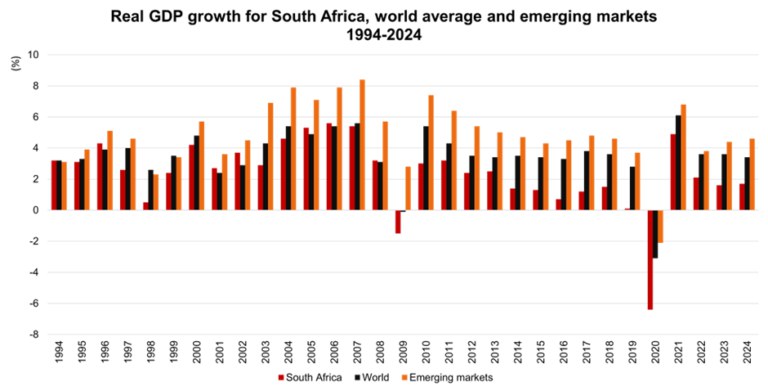![[Opinion] Economic freedom in our lifetime? [Opinion] Economic freedom in our lifetime?](https://cra-sa.com/media/opinion-economic-freedom-in-our-lifetime/@@images/0d0353dc-2e99-4bce-87a9-77a8a4a3b3e4.jpeg)
How free is South Africa, in economic terms?
According to the latest Economic Freedom of the World Report (EFW) South Africa is ranked 99th, out of 165 jurisdictions. Using data from 2020, the latest version of the EFW measures economic freedom across five categories: Size of Government, Legal System and Property Rights, Sound Money, Freedom to Trade Internationally, and Regulation. South Africa’s ranking is down from last year’s index (93rd), 87th on 2015 data, 76th on 2010 data, and 52nd on 2000 data. The country’s consistent slide down the economic freedom rankings is evidenced by the quality of life decline metrics experienced by most South Africans – the result of the government’s chosen ideological and policy positions.
Citizens who live in economically freer countries tend to experience a higher quality of life, on average, as against their compatriots in other nations. Economic freedom translates into more scope for individuals to trade with each other, to engage in employment on their chosen terms, and to know that the work and risks they undertake to start or grow businesses will not be consumed in the form of taxes by ever-hungry, more centralised, and top-heavy governments.
According to the EFW, those countries in the top quartile of the rankings had an average per-capita GDP of $48 251 in 2020. This was compared to $6 542 for nations in the bottom quartile, ay constant 2017 US dollars, at purchasing power parity (PPP).
Opportunities
Furthermore, citizens with lower incomes but who live in economically free countries tend to experience a higher quality of life, and have more opportunities to create wealth for themselves, than people who live in countries which have lower levels of economic freedom. The average income of the poorest 10% in the top quartile of countries was $14 204, compared to $1,736 in the bottom quartile (at constant 2017 US PPP dollars). The EFW also highlights that the average income of the poorest 10% citizens in the most economically free nations is more than twice the average per capita income in the least free nations.
Much time is spent talking about the ‘triple challenge’ faced by South Africa, namely: inequality, poverty, and unemployment. The EFW shows that, in the top quartile of countries on the EFW rankings, “2.02% of the population experience extreme poverty (US$1.90 a day) compared to 31.45% in the lowest quartile.” Inequality is a feature, not a bug, of real economic and political freedom. The problem arises when inequality and poverty become entrenched, and the policy choices of politicians and bureaucrats destroy the ability of citizens to create wealth and move themselves out of poverty. For anyone truly serious about addressing poverty in South Africa, the answer lies in more economic freedom, to reverse the growing trend of more citizens dependent on some form of government grant than in employment.
As a result of an unreliable electricity supply, threatening policy and regulatory sounds (especially around expropriation without compensation), and security and business-operation risks, the country’s manufacturing capacity has steadily declined. This brings the added problem that, as the world now heads into a tighter economic environment with rising interest rates and energy prices, businesses and consumers are exposed to more imported inflation. Renewed manufacturing capacity and industrialisation will not be brought about through arbitrary government edicts and social compacts. Only more economic freedom would encourage substantive capital formation and industrial activity to take place.

Source: National Treasury, IMF
Economic freedom and wealth creation
Economic freedom and wealth creation go hand in hand. South Africa can have various forms of welfare and charity assistance for those citizens who find themselves in dire circumstances – indeed, private charity is much more direct and focused than ‘assistance’ administered by legions of bureaucrats. But neither public nor private welfare-type assistance will take place if conditions are not right for wealth to be created in the first place. Taking for granted that wealth creation will simply always occur, is a fundamental misunderstanding of the very process.
In June of this year, Mmamoloko Kubayi, the Head of Economic Transformation for the ANC, addressed the Progressive Business Forum. She called on business to invest, unconditionally, in the country, as every effort was being made to rebuild the economy.
Wishing differently doesn’t change reality; all the pronouncements of the state cannot just force wealth creation into being. With less economic freedom comes more dependence on the state – a necessary feature, not an accident, of the ideology that is the National Democratic Revolution (NDR). Absent the removal of the party that will always aim to implement the NDR, South Africans’ economic (and political) freedoms will be under threat.
Should government adopt legislation such as the Expropriation Bill, the Land Court Bill, plans such as prescribed assets, and should state power-expanding schemes such as National Health Insurance, Localisation Master Plans, and a Basic Income Grant, become reality, the economic freedoms of South Africa will become further diluted. This path represents fewer chances for individuals to create wealth for themselves, their families, and their communities, and instead will solidify a state of affairs where what matters most is who you know in the corridors of government power.